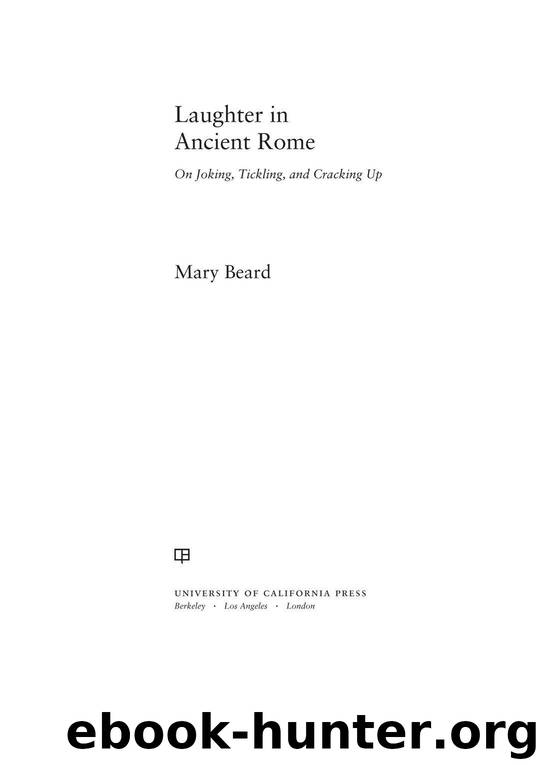Laughter in Ancient Rome: On Joking, Tickling, and Cracking Up (Sather Classical Lectures) by Beard Mary

Author:Beard, Mary [Beard, Mary]
Language: eng
Format: mobi, azw3
ISBN: 9780520277168
Publisher: University of California Press
Published: 2014-07-10T16:00:00+00:00
This is a simple set of connections between laughter and mimicry and mime but one that can enrich our understanding of some famous passages of Roman literature. I have already highlighted (p. 159) one particular line in Catullus’ poem on the verses he wants given back: the tart who is hanging onto his poetry tablets laughs, he writes, mimice ac moleste. I glossed this provisionally as “in the style of a mime actress,” and that is generally the sense that most translators of the poem now give. For Guy Lee, this was the “odious actressy laugh” of the whore; for John Godwin, the woman was “laughing like an actress”; for Peter Whigham, she was “like a stage tart.” Commentators too take broadly this line, with Kenneth Quinn reducing the image to that of a pouting ancient equivalent of a modern cinema starlet.66 Some of this may underlie Catullus’ invective; it seems likely that there was laughter on (as we would say) both sides of the curtain at a mime, and it is not unreasonable to suppose that mime actors and actresses had a distinctive, perhaps lewd, laugh—though hardly, I think, a starlet’s pout. But Catullus’ gibe is edgier than that. Almost impossible as it is to translate, it parades the idea of vulgar, bodily, laughable imitation on the part of the thieving whore. It may also point to the fact that if the girl is to be seen in a mimic guise, then—as much as she is cackling “like a stage tart”—we too are laughing at her. And that, of course, is exactly what the poem itself is doing.
Some of these issues also underlie the so-called Quartilla episode, near the beginning of what survives of Petronius’ first-century CE novel, Satyricon. Modern critics have intensely discussed this story—partly because there are so many gaps in the text we have that it is an intriguing challenge to explain exactly what happens and in what order.67 But it is clear enough that, as the surviving story opens in the standard version, the narrator and the antiheroes of the novel receive a visit in their lodgings from an attendant of Quartilla, a priestess of the phallic god Priapus. She announces the imminent arrival of her mistress—who is coming to call on the men in response to their earlier disruption of Priapus’ holy rites. When the priestess arrives shortly after, she sheds a stream of histrionic tears about the sacrilege committed, then embarks on a full-on orgy—many of whose details are (maybe happily) lost in the lacunae of the text as it has come down to us.
As most critics have observed, laughter is a recurring element in this episode (and Maria Plaza has rightly pointed to many of the tricky interpretative difficulties it raises in the narration—in terms of who is laughing at whom and whose laughter we treat as authoritative68). But there is, for my concerns in this chapter, a particularly relevant outburst immediately before the scripted orgy starts. Just as Quartilla moves from
Download
Laughter in Ancient Rome: On Joking, Tickling, and Cracking Up (Sather Classical Lectures) by Beard Mary.azw3
This site does not store any files on its server. We only index and link to content provided by other sites. Please contact the content providers to delete copyright contents if any and email us, we'll remove relevant links or contents immediately.
| Ancient & Classical | Arthurian Romance |
| Beat Generation | Feminist |
| Gothic & Romantic | LGBT |
| Medieval | Modern |
| Modernism | Postmodernism |
| Renaissance | Shakespeare |
| Surrealism | Victorian |
4 3 2 1: A Novel by Paul Auster(11034)
The handmaid's tale by Margaret Atwood(6837)
Giovanni's Room by James Baldwin(5872)
Big Magic: Creative Living Beyond Fear by Elizabeth Gilbert(4718)
Asking the Right Questions: A Guide to Critical Thinking by M. Neil Browne & Stuart M. Keeley(4566)
On Writing A Memoir of the Craft by Stephen King(4205)
Ego Is the Enemy by Ryan Holiday(3982)
Ken Follett - World without end by Ken Follett(3968)
The Body: A Guide for Occupants by Bill Bryson(3789)
Bluets by Maggie Nelson(3705)
Adulting by Kelly Williams Brown(3663)
Guilty Pleasures by Laurell K Hamilton(3578)
Eat That Frog! by Brian Tracy(3508)
White Noise - A Novel by Don DeLillo(3430)
The Poetry of Pablo Neruda by Pablo Neruda(3358)
Alive: The Story of the Andes Survivors by Piers Paul Read(3303)
The Bookshop by Penelope Fitzgerald(3221)
The Book of Joy by Dalai Lama(3212)
Fingerprints of the Gods by Graham Hancock(3206)
